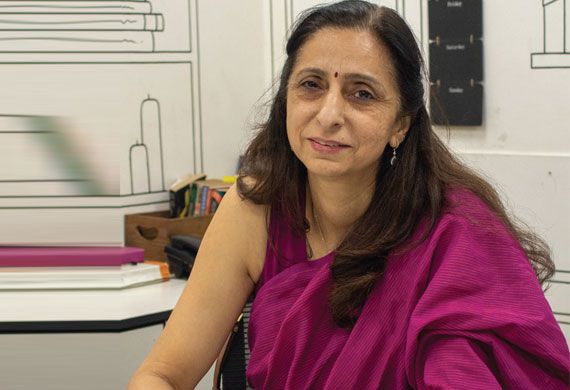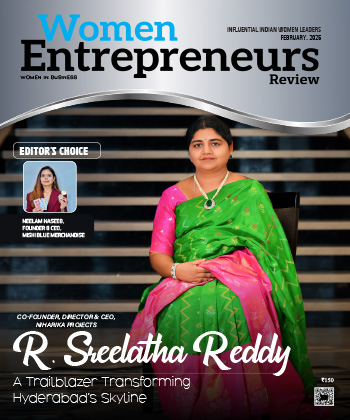Leaders

Monisha Datta: Experienced Educationalist Designing Inclusive Learning Frameworks
Monisha Datta
Director, The Doon Girls' School
Dehradun
The academic landscape is undergoing a strategic transformation to meet the evolving needs of today’s diverse student population, who must prioritize flexible, inclusive frameworks. An inclusion-based curriculum enables institutions to nurture individuals’ strengths while addressing learning gaps, ensuring no talent is left behind. By fostering adaptive thinking and emotional intelligence, such models drive both academic excellence and workforce preparedness. This shift is not just a social imperative but a critical investment in building a future-ready talent pipeline.
Monisha Datta, a seasoned professional, brings 25 years of experience to imbibe purpose-driven learning into every aspect of school culture. Her strategic initiatives are grounded in the belief that true education means learning to respect diversity, act ethically, and contribute meaningfully to both local and global communities. With a strong foundation in family therapy and certified expertise as a Life Coach, Monisha brings a unique blend of emotional intelligence and strategic insights to the education sector. Her work bridges curriculum innovation and human development, ensuring students and teachers are equipped with the necessary tools to succeed in an ever-changing world.
Take us through your professional journey as an educator and curriculum design specialist. What other key areas of expertise have you developed over the years?
My passion for creativity allowed me to actively shape diverse initiatives within the school. I discovered the value of interdisciplinary teaching, which could be used to enhance engagement. Faced with gaps in curriculum interpretation and delivery, I explored educational models abroad. My visits to schools in Europe and UK revealed innovative methodologies and more integrated approaches to teaching. These global learnings now shape my approach to delivering the CICSE curriculum with clarity and relevance.
To address curriculum gaps, I led the development of inhouse learning systems, incorporating thematic and ageappropriate methodologies. We introduced differentiated instructions tailored to students’ needs. This has evolved into a fully operational Special Educational Needs (SEN) department today, supporting students with autism, Down syndrome, and other needs through inclusive and vocational programs. Progress Through Adversity, This Too Shall Pass
What inspired you to pursue a leadership course at IIM Calcutta? Tell us about the key takeaways from the course.
Educational leadership often centers around curriculum and instruction, leaving critical areas like financial planning and organizational strategy underexplored. To become a well-rounded education leader, I recognized the need to build business acumen beyond academics, and that led me to IIM Calcutta. The goal was to enhance my ability to drive growth through strategic thinking and cross-functional leadership.
Previously, the limited availability of robust online programs made professional development challenging. Understanding how to work with available resources more effectively helped me confidently launch a full-fledged inclusion center. What had previously been scattered efforts became a unified vision executed with precision and purpose.
Introduce us to The Doon Girls' School and your key responsibilities as the educational institution’s Director.
My role encompasses strategic planning, administrative oversight, and the continuous professional development of educators. I facilitate ongoing training to keep staff aligned with industry advancements and also serve as a certified life and mental coach for both faculty and students. I also lead annual planning for key on and off-campus initiatives.
I design and oversee pioneering events tailored to fill existing gaps in the education ecosystem. A key part of my role is also to mentor teachers by aligning their strengths with career-building responsibilities. I also deliver life skills sessions that equip students with tools to manage challenges beyond the classroom.
How did your time at IIM Calcutta help you strengthen your capabilities as an educator and leader?
Interacting with a group of highly research-driven peers has opened up a wealth of shared knowledge. Being part of a global cohort, including professionals from Dubai and other countries, has also given me early access to trends and practices ahead of their implementation in my local context. Working closely with students serves as a constant reflection point. It reveals not only what we teach but how we communicate. The process of unlearning outdated habits and adopting a more sensitive, internal way of speaking is key to fostering safe and supportive learning environments.
Additionally, observing patterns of behaviour in young learners has led me to deeper inquiry into developmental psychology. Recognizing this, I enrolled in an MSc program in Behavioural Science and Family Therapy to better understand family dynamics and their impact on a child’s well-being. I recently completed a fellowship in Gestalt Therapy, which has proven invaluable in my day to-day interactions with students.
What are some key career milestones for you? What is your ‘success mantra’?
The pandemic revealed stark inequalities in access and engagement, particularly for neurodivergent learners. Addressing this gap became a priority. Witnessing the tangible development and confidence of these students has been incredibly rewarding and represents a turning point in how I measure impact and progress.
I view my professional journey as an ongoing evolution, not a fixed destination. For me, success is not a straight path, it is a dynamic experience shaped by persistence and perspective. There are moments where everything aligns and at other times, things dip and challenge your outlook. Staying focused, adaptable, and grounded during both peaks and troughs allows me to continuously grow and lead with resilience.
How do you foresee the Indian education landscape evolving? How is The Doon Girls' School aligning with evolving industry trends?
One of the most encouraging developments is the narrowing divide between government and private institutions. With broader access to learning resources and innovative delivery methods, education is becoming more inclusive and accessible across socio-economic groups. The New Education Policy is a reinvention of the foundational principles of learning in the country. By making inclusion a non-negotiable standard, it acknowledges the diverse needs of learners and adapts to the evolving mindset of today’s youth.
Our vision for Doon Girls School is to become a recognized incubator for 21st century skills. We are cultivating a generation of learners who excel not only in academia but also in creative problem-solving, innovation, and critical thinking. Students are being equipped with a digital and design-oriented mindset, catering to the demands of the modern, interdisciplinary world.
Monisha Datta, Director, The Doon Girls' School
Monisha Datta is a strategist empowering educators and leaners through evolving education models.
A Life Skills Coach, Behaviour Science and Family Therapist, with a fellowship in Gestalt therapy, Monisha Datta is dedicated to transform education through inclusive and progressive teaching methodologies. Her professional journey has centered around upskilling educators, fostering leadership, and promoting mental wellness in school ecosystem. She empowers education leaders to create meaningful learning environments built on empathy, innovation, and long-term resilience.
Most Viewed
- 1 Women's Health Startup HerMD Closing Doors Amid Industry Challenges
- 2 5 Famous Women in Indian Armed Forces
- 3 Saudi Women No longer Require Male Permission for Clothing Choices, says Prince MbS
- 4 Kolkata Medtech Startup Innovodigm Raises Rs 5.5 Crore Seed Funding Led by IAN Group
- 5 Yamunanagar's Kashish Kalra Honoured after Securing 111th Rank in UPSC Civil Services Exam
- 6 Madurai Appoints Its First Woman Corporation Head
- 7 IAS Vijayalakshmi Bidari Appointed as the new Nagpur Divisional Commissioner
- 8 American Entrepreneur Lucy Guo Overtakes T Swift to become Youngest Female Billionaire
- 9 ICC Women's World Cup 2025 Trophy Showcased at Indore's Holkar Stadium
- 10 Aparna Saxena's Beauty Venture AntiNorm Launches in India
- 11 Vidya Nataraj Co-Founded BlueStone Jewellery & Lifestyle files IPO
- 12 5 Women Freedom Fighters of India
- 13 Dr. G Krishnapriya appointed as CEO for Trichy
- 14 M3M & Sirona Partner to Introduce Menstrual Hygiene Vending Machines in 15 Locations
- 15 Punjab Govt launches SHE Cohort 3.0 Supporting Tech-led Women Startups
- 16 Indian origin Lawyer, Sweena Pannu appointed as the US New Superior Court Judge
- 17 The Aurora Tech Award recognizes 4 Indian Women-led Startups
- 18 Kerala's Republic Day parade featured an all-female tableau
- 19 Manisha Kabbur Becomes Karnataka's First Woman International Karate Coach
- 20 Director K. S. Ravikumar's Daughter Maalica Ravikumar Launches Life Coaching Company 'Evergrowth Academy' for Women
- 21 Leezu's Raises Pre-Seed Funding to Accelerate Growth in Sexual Wellness Industry
- 22 Sattu: Super-easy summer drink for PCOS gut healing
- 23 Swathi Nelabhatla creates Sitha App, India's First Women-Exclusive Gig Platform
- 24 7 Timeless Female Kathak Dancers & their Iconic Legacies
- 25 Meet 7 Iconic Women Architects of Modern India & their Most Impactful Work
- 26 This Woman-led Insuretech Startup is Helping Bridge the Education Financing Gap in India
- 27 Women Leaders Share Lessons Learnt from India Women's WC Win
- 28 5 Enterprising Women Founders Powering Singapore's Tech & Innovation Landscape
- 29 4 Women. 4 Stories. One Vision for Smarter, Stronger Healthcare
- 30 Global Gender Gap Narrows to 68.8%, But Full Equality 123 Years Away: WEF Report 2025
- 31 Changemakers: 7 Women Entrepreneurs Taking the Make in India Movement Forward
- 32 Meet Lucy Guo, The Youngest Self-Made Female Billionaire Disrupting Tech
- 33 How Women are Driving India's Festive Online Shopping Surge






